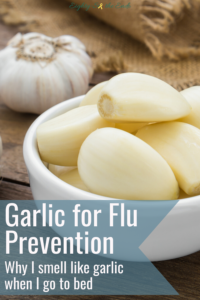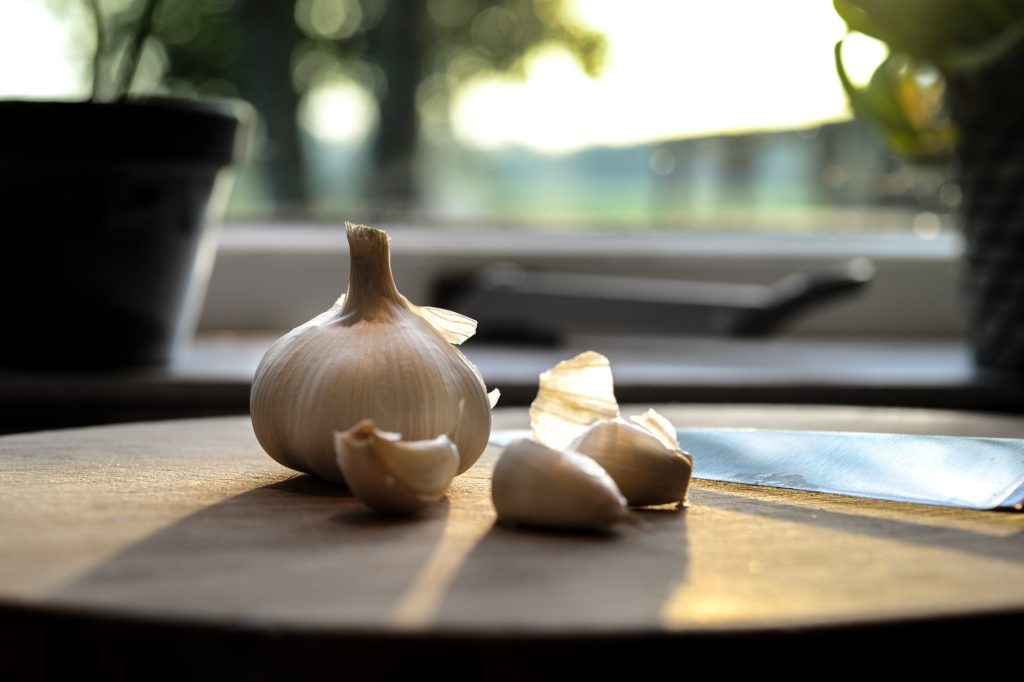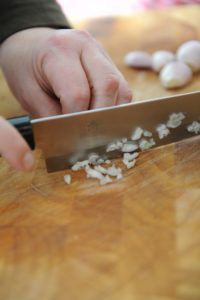Has anyone ever told you that garlic prevents respiratory infections?
I’m sure I am not the first to admit that garlic can make you stink; which is why I am always sure to consume it just before going to bed. But this little trick that my mother taught me has proven to be effective time and time again.
You see, garlic is one of the best herbs for preventing, and shortening the length of an upper respiratory infection. And since endometriosis can lead to a decreased immune system, I often find myself on the verge of developing a cold or the flu.
 Since we are in the prime season for vacations, I know that many Endo Warriors will be struggling to fight the many germs that come with traveling.
Since we are in the prime season for vacations, I know that many Endo Warriors will be struggling to fight the many germs that come with traveling.
But even if you aren’t traveling, many of us have added stress this time of year. The kids are out of school, midyear evaluations come up at work, and our electricity bills follow the rising temperatures. These added stressors can definitely effect your immune system and it’s ability to fight off infection.
So, although the summer season is fun-filled, I know that it can also come with its challenges. In today’s post I want to share the research-based evidence that makes garlic so powerful in preventing and minimizing sick days!
Garlic Prevents Upper Respiratory Infections
Herbal medicine has been utilized for thousands of years to help treat and prevent illness. But more recently people are turning to Western Medicine when they want to treat infections. However, sometimes the simplest and most cost-effective way to treat these infections is by consuming herbs; specifically, garlic.
Garlic, scientifically named Allium sativum, is not only a delicious addition to many recipes, but can be used on its own to treat many infections (2). Notably, it has antiviral (works against viruses) properties that have been studied in many clinical trials over time.
The results of these many trials are worth sharing!
In one study, there was “a 37% reduction in the number of colds . . . and a 30% reduction in the duration of illness” (1). And in another trial, they “found a 61% reduction in the number of days [the infection was present] . . . and a 21% reduction in symptoms” (1).
These findings are really significant, and I can attest to the fact that these numbers represent my experience with garlic as well. 
My Recent Experience with Garlic
Two weeks ago, I spoke with my manager about increasing my work status from part-time to full-time. Although I was able to increase my hours this past week without feeling any increased endo pain, my immune system made it clear that it was struggling with the added stress.
Towards the end of the week, I woke with a severe sinus headache and deep congestion. That night, I consumed raw garlic, as I have always done at the first sign of a cold or flu.
The next morning, I awoke without a headache and the ability to cough out all of the congestion that was previously hard to expel. Basically, the garlic assisted my body in getting rid of the congestion.
I repeated this process on Sunday night, which allowed me to start my work week without any symptoms. Garlic really works!
How Garlic Prevents Upper Respiratory Infections
For one, garlic is a natural pre-biotic, in that it helps stimulate the gut in making good bacteria; the type that aids in digestion and fights bad bacteria. In promoting “friendly” bacteria, garlic is helping the immune system fight off infections.
Secondly, garlic has been shown to activate macrophages, the large immune cells that are specifically used to attack infections (1).
Ways to Consume Garlic
I find that the best way to consume garlic when trying to ward off a respiratory infection, is by eating it raw. This is something I have been doing since I was a child, as it was passed down to me by my mother.
Of course, eating an entire clove of raw garlic is difficult, unpleasant, and a choking hazard. So, in order to ease the process, I have always finely chopped 1 clove of garlic into pill size pieces. Then I toss back the handful of garlic, quickly following it with water.
I prefer this method over mincing the garlic because the oils that are released with mincing make the whole process extremely unpleasant.
Additionally, I strongly advise you do this just before going to bed; primarily for the reason that garlic will make your breath stink and your pores wreak.
By eating the garlic at night, you are saving yourself from the embarrassment of having to go out in public smelling of garlic. Usually by the time you wake, the scent has diminished and a shower will make it completely unrecognizable.
Other ways to consume garlic:
- Add more garlic to your meals when cooking
- Take high quality garlic supplements
More Garlic Benefits
In this day and age, it is very common to find people who have been diagnosed with high blood pressure and high cholesterol. These two diagnoses contribute to the risk of having a heart attack, stroke, or chronic heart failure.
Although there are many prescriptions that can be used to treat these conditions, they come with many side effects and risks.
However, garlic can be utilized as an effective alternative to common prescriptions used for high blood pressure and high cholesterol. Even better, garlic has little to no side effects.
So, if you or someone you know has been diagnosed with Hypertension (high blood pressure) or Hyperlipidemia (high cholesterol), then talk to your doctor about garlic supplements as a treatment option.

Some People Should Avoid Garlic
As beneficial as garlic can be, it is ALWAYS best to talk with your doctor before starting to dose yourself with extra garlic. Most people can safely eat cooked garlic with meals, but supplementation with garlic tablets or consuming raw garlic may also be dangerous.
If you are taking any blood thinners, like warfarin (coumadin), heparin, enoxaparin, or even aspirin, then you should avoid consuming additional garlic.
Garlic is a natural blood thinner, and can place you at high risk for bleeding if you are on these medications.
And I’m not talking about menstrual bleeding; we all know that most endo warriors already struggle with heavy periods. Instead I am talking about internal bleeding, bleeding in the gut, and/or unexplained bleeding.
Garlic can also decrease the effectiveness of some medications. Therefore, it’s always best to consult with your doctor first.
Summary
- Garlic prevents upper respiratory infections by helping the immune system.
- It can help treat high blood pressure and high cholesterol.
- Garlic will make your breath and pores stink, so it’s best to consume the garlic at bedtime.
- Consuming extra garlic should be avoided if you are on blood thinners.


- Ried, K. (2016). Garlic Lowers Blood Pressure in Hypertensive Individuals, Regulates Serum Cholesterol, and Stimulates Immunity: An Updated Meta-analysis and Review. The Journal of Nutrition, 146 (2), 389S–396S. https://doi.org/10.3945/jn.114.202192
- Yarnell, E. (2018). Herbs for Viral Respiratory Infections. Alternative and Complementary Therapies, 24 (1). http://doi.org/10.1089/act.2017.29150.eya

